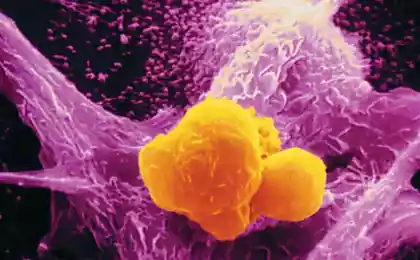414
Scientists short-term hunger strike renews the immune system
Short-term hunger turns to immunity double benefit: first, fade the old, damaged cells, and second, activates the blood stem cells to regenerate the cellular reserves of the immune system.
The benefits of hunger you can learn not only from the esoteric practices, devoted to "the unity of the spiritual and the bodily", but also from traditional scientific articles. Researchers have long been convinced that hunger (or, at least, reasonable calorie intake) hinders the development of many diseases and increases life expectancy. However, exactly how fasting is beneficial that the mechanisms involved here, until the end has not been identified yet.

For a long time, everyone thought that starvation acts on the body through protein sirtuin. Then the role of this protein is questioned, but last year, researchers from Washington University in St. Louis seemed able to prove that certain really is associated with increased life expectancy, and moderation in eating. There is evidence that life expectancy is increasing under the influence of the protein FGF-21, which is sometimes called the "hunger hormone". On the other hand, researchers from the University of Alabama at Birmingham, who has studied the relationship of hunger and Alzheimer's disease, found that moderation in calories slows down the progression of the disease with a protein called ghrelin, which is also known as "the hunger hormone".
In a recent article published in Stem Cell журналеCell, Valter Longo (Valter Longo), together with colleagues from the University of southern California describe one positive cell-physiological effects of fasting – is, with its help you can upgrade your immunity. Fasting in this case refers to the present: the experiment lasted six months, and during this time, the experimental mice from time to time arranged for 2-4 days periods without food. The number of leukocytes in their blood fell, but when the animals again began to eat, the level of immune cells increased.
It is clear, why cells disappeared: hunger forced to spend nutrient reserves, but he also "ate" of the old immune cells. These leukocytes are already so felt bad that he could not adequately work, and because the shortage of nutrients, it is best just to digest them. However, the disappearance of old, pauloman of immune cells in the ran signaling pathway, which activated blood stem cells. They activated a recycling program, and they began to divide and generate new leukocytes, which, of course, were better than ever. That is, using a series of short-term hunger strikes could kill two birds with one stone: to remove old cell debris and replace it with new cells. At the same time decreased the protein level of IGF-1, which, as shown by previous experiments, is associated with aging and the appearance of malignant tumors.
Among mice the researchers were not limited to: they conducted the same experiment with multiple cancer patients who had chemotherapy. Cancer drugs kill tumor cells, but hurt normal cells. This affects many systems of the body, including the immune system. It turned out, three days of fasting alleviates side effect from chemotherapy, the immune system to tolerate it better than without hunger. Obviously, it was the activity of stem cells, which promptly replaced the leucocytes, damaged by anticancer drugs.
The authors believe that this new immune system can be used in a variety of diseases, from age-related immune deficiency to AIDS. Most likely, the only one immune system here is not limited, and with the help of hunger you can update and other tissues and organs. However, in order to verify this (and in the absence of side-effects) method to update the hunger should go full-scale clinical trials.
Source: nkj.ru
The benefits of hunger you can learn not only from the esoteric practices, devoted to "the unity of the spiritual and the bodily", but also from traditional scientific articles. Researchers have long been convinced that hunger (or, at least, reasonable calorie intake) hinders the development of many diseases and increases life expectancy. However, exactly how fasting is beneficial that the mechanisms involved here, until the end has not been identified yet.

For a long time, everyone thought that starvation acts on the body through protein sirtuin. Then the role of this protein is questioned, but last year, researchers from Washington University in St. Louis seemed able to prove that certain really is associated with increased life expectancy, and moderation in eating. There is evidence that life expectancy is increasing under the influence of the protein FGF-21, which is sometimes called the "hunger hormone". On the other hand, researchers from the University of Alabama at Birmingham, who has studied the relationship of hunger and Alzheimer's disease, found that moderation in calories slows down the progression of the disease with a protein called ghrelin, which is also known as "the hunger hormone".
In a recent article published in Stem Cell журналеCell, Valter Longo (Valter Longo), together with colleagues from the University of southern California describe one positive cell-physiological effects of fasting – is, with its help you can upgrade your immunity. Fasting in this case refers to the present: the experiment lasted six months, and during this time, the experimental mice from time to time arranged for 2-4 days periods without food. The number of leukocytes in their blood fell, but when the animals again began to eat, the level of immune cells increased.
It is clear, why cells disappeared: hunger forced to spend nutrient reserves, but he also "ate" of the old immune cells. These leukocytes are already so felt bad that he could not adequately work, and because the shortage of nutrients, it is best just to digest them. However, the disappearance of old, pauloman of immune cells in the ran signaling pathway, which activated blood stem cells. They activated a recycling program, and they began to divide and generate new leukocytes, which, of course, were better than ever. That is, using a series of short-term hunger strikes could kill two birds with one stone: to remove old cell debris and replace it with new cells. At the same time decreased the protein level of IGF-1, which, as shown by previous experiments, is associated with aging and the appearance of malignant tumors.
Among mice the researchers were not limited to: they conducted the same experiment with multiple cancer patients who had chemotherapy. Cancer drugs kill tumor cells, but hurt normal cells. This affects many systems of the body, including the immune system. It turned out, three days of fasting alleviates side effect from chemotherapy, the immune system to tolerate it better than without hunger. Obviously, it was the activity of stem cells, which promptly replaced the leucocytes, damaged by anticancer drugs.
The authors believe that this new immune system can be used in a variety of diseases, from age-related immune deficiency to AIDS. Most likely, the only one immune system here is not limited, and with the help of hunger you can update and other tissues and organs. However, in order to verify this (and in the absence of side-effects) method to update the hunger should go full-scale clinical trials.
Source: nkj.ru
SeaOrbiter - space science ship for the ocean + video
Leaf-shaped turtle from Fort Wayne Children's Zoo























